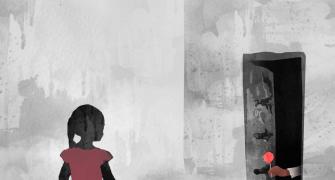Bruce Riedel, senior National Security Council official in the Clinton Administration, who spearheaded President Obama's strategic review on Afghanistan and Pakistan, told rediff.com that for all the Pakistani leadership assurances that the ISI has severed its links with terrorist groups like the Lashkar-e-Tayiba and the Taliban, the ISI's association with them is as entrenched as ever.
In an interaction that followed his remarks and that of other experts at a discussion on Afghanistan and Pakistan: A Status Report, organized by The Brookings Institution, Riedel said change is "not going to come overnight," and pointed to the recent release of LeT leader Hafiz Mohammed Saeed as a tangible manifestation of these entrenched links.
Riedel, currently a Senior Fellow at Brookings, said, "This relationship is built over 30 years," with these groups "and is not going to be resolved overnight."
"First of all, many Pakistanis don't believe we'll be there," in the region over the long-term. "They believe we're going to cut and run, whether it is three years from now or four years from now." Thus, Riedel said, these so-called strategic assets for Islamabad's efforts to maintain a strategic depth against India in Afghanistan and to fight its proxy war in Kashmir would continue to be a kind of insurance policy in the event of a US withdrawal and a diminution of massive assistance as has been the experience of the past. "Changing that calculation will be critical," he said, if the US is to succeed in persuading Pakistan to "change their policies," towards these groups. But Riedel acknowledged that "the hard part right now," was to convince Pakistan to sever its links with these groups because the ISI evidently believe that these associations will pay off in the long run.
"They feel that time in on their side," he said, "and till we just start to change these perceptions, I don't think we are going to be successful." Riedel said this in no way should preclude the US from "constantly raising this (concern over ISI links with LeT and Taliban) at the highest levels" in Pakistan and lauded Special Representative Richard Holbrooke for harshly criticizing Islamabad's release of Saeed.
Riedel, who made clear at the outset of the discussion that he was "not here as a spokesman for the US Government or for President Obama," said, "There are still far too many signs that the Pakistani leadership continues to believe in a policy I would call 'selective terrorism.' "Which is that there are good jihadists and bad jihadists. Bad jihadists are punished, good jihadists are patronized," he said. "And, this is a long-standing policy that the Pakistan government has pursued," to maintain strategic depth against India," Reidel said.
He reiterated that "it is very difficult to persuade the Pakistani military, and particularly Pakistani intelligence service that these jihadists are no longer useful assets for the future," and he said, none was more important to the ISI than "the Kashmiri assets, particularly the Lashkar-e-Tayiba under the new name Jamat-ut-Dawa."
Riedel said the release of Saeed "from the farce of being under house arrest," was not just a "step in the wrong direction," but one that "clearly sends a signal that these are regarded as good jihadists by the Pakistani state and is a serious setback to any prospect of diminishing tensions between India and Pakistan."
In his opening remarks, Riedel said, "Pakistan has now become the epicenter of the global Islamic Jihad. The stakes here are enormous. A 175 million Muslims, the second-largest Muslim country in the world, the fastest growing nuclear arsenal in the world, and a hot-house of terrorist groups that is really unrivalled anywhere in the world."
He said al Qaeda leader Osama bin Laden's statement coinciding with Obama's visit to Egypt to deliver a speech to the Muslim world, was not "a commentary on the President's visit to Saudi Arabia," but one that was clearly focused on Pakistan and "a clear call for Jihad against the Pakistani government and the Pakistani state."
Riedel said, "The jihadists smell blood in the water and there's a good reason for them to think it. Today, there's a real possibilitynot inevitable, not the most likely, certainly not imminentbut a real possibility of a jihadist take over in Pakistan." However, he acknowledged that the Pakistani military's actions against the Taliban in the Swat Valley was "the most coherent, and the largest counter-terrorism military offensive by the Pakistani state."
"More important than that though is the public seems to be backing the offensive. For the first time since 9/11, the Pakistani Army is fighting the jihadist forces, fighting the Taliban with generally popular support." But, he said that it is too soon to predict "that we are at a tipping point," and argued that from past experience, skepticism is in order.







